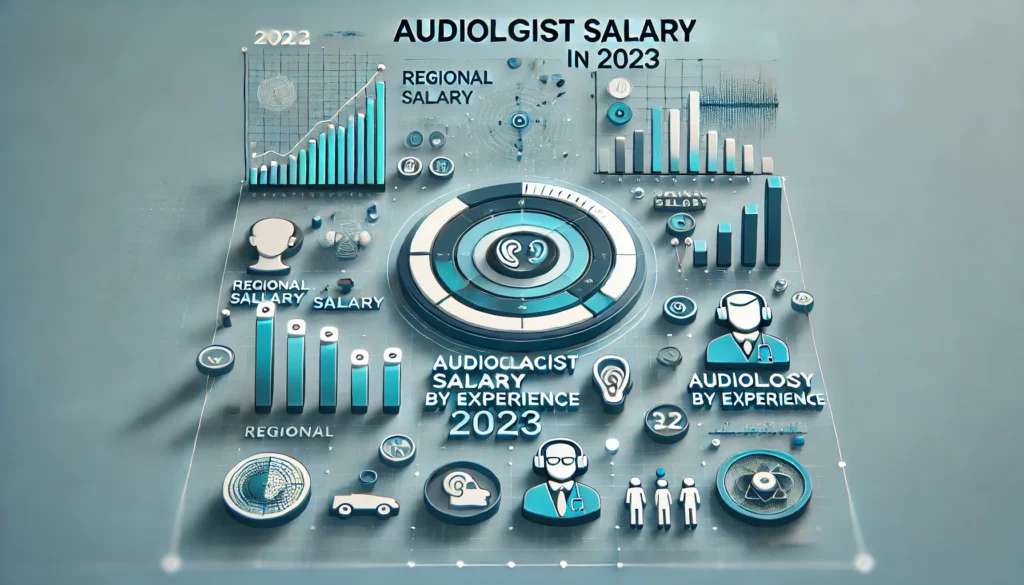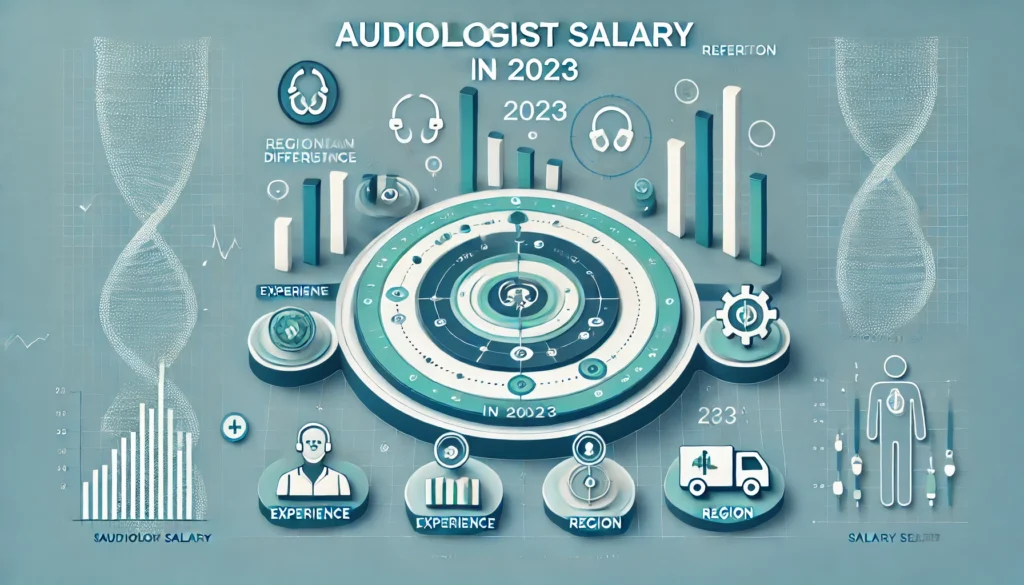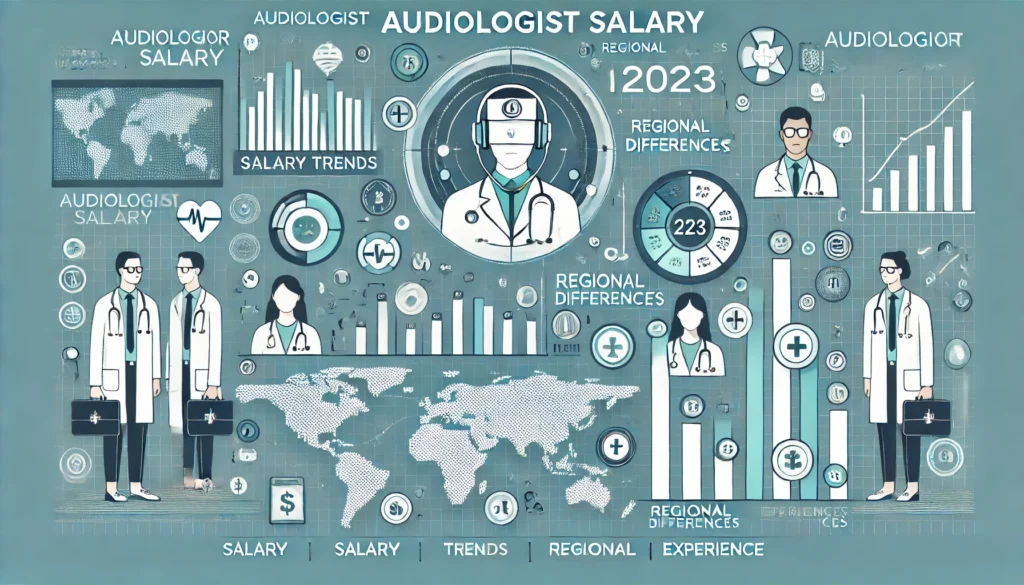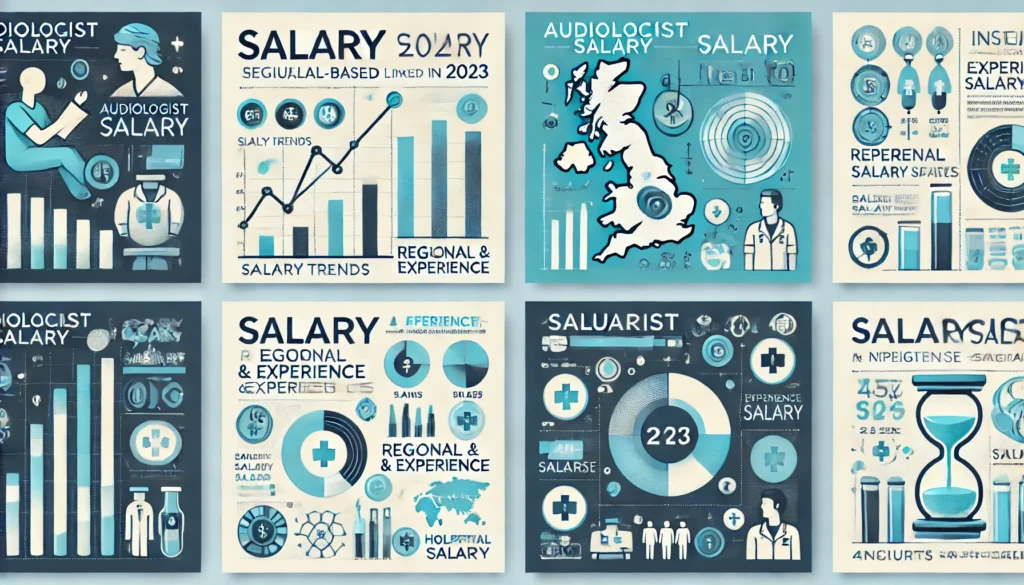What’s the Real Audiologists Salary, and Are They Being Paid Enough for Their Expertise? As healthcare continues to evolve, so does the recognition of the importance of audiologists in the healthcare system. Audiologists are highly skilled professionals specializing in diagnosing and treating hearing and balance disorders. Yet, despite their critical role in improving the quality of life for patients, there remains an ongoing debate about their compensation.
In this blog post, we will discuss audiologists’ salaries, shedding light on their invaluable contributions to healthcare and advocating for fair compensation that reflects their expertise. We will explore the salary trends, factors affecting pay, and ways to elevate audiologists’ professional recognition and compensation.

Understanding the Role and Expertise of Audiologists
What Do Audiologists Do?
Audiologists diagnose, treat, and manage hearing loss and related conditions, such as tinnitus and balance disorders. They are experts in the auditory system and are trained to help individuals navigate the complexities of hearing and communication challenges.
Some of the core responsibilities of an audiologist include:
- Conducting hearing tests to assess hearing levels and identify any impairments.
- Providing hearing aids and assistive devices to improve hearing function.
- Diagnosing and managing balance disorders caused by inner ear issues.
- Educating patients and families on hearing protection and coping strategies for hearing loss.
- Working with individuals with special needs or those suffering from severe hearing loss.
With the growing need for hearing care, particularly among aging populations, the role of audiologists has become more vital than ever. However, despite the significance of their work, audiologist compensation has often been a point of contention.
Audiology and Hearing Healthcare
Audiology is a specialized field within healthcare, and audiologists play an essential part in the broader spectrum of hearing healthcare. They often work closely with speech-language pathologists, occupational therapists, and physicians to provide comprehensive care to auditory or balance disorders patients.
Audiologists can work in various settings, including hospitals, private practices, schools, and rehabilitation centers. Their work is integral to improving patients’ auditory health and quality of life, mental health, and social integration.
Given the advanced education and expertise required in the field, it’s important to consider how audiologists’ salaries reflect these high standards and their broad contributions to healthcare.
Skills and Qualifications That Set Audiologists Apart
To become an audiologist, one must complete a doctoral program in audiology (Au.D.), which typically requires 4 years of study following an undergraduate degree. In addition to academic qualifications, audiologists must also undergo rigorous clinical training and obtain state licensure to practice.
Audiologists need a wide range of skills, such as:
- Technical skills to operate diagnostic equipment like audiometers.
- Communication skills to effectively convey complex information to patients and their families.
- Problem-solving abilities to diagnose and develop treatment plans for various hearing and balance issues.
- Patient-centered care to manage long-term care and establish trust with patients dealing with sensitive conditions.
As a result, audiologists offer a unique and valuable set of skills crucial to improving the health and well-being of those with hearing and balance issues. Despite these contributions, however, audiologists’ salaries don’t always reflect the breadth of their qualifications and expertise.

The Growing Demand for Audiologists in Healthcare
Rising Need for Hearing Care Professionals
The demand for audiologists has been steadily increasing due to several factors, notably the aging population. As more people enter their senior years, age-related hearing loss also rises. According to the World Health Organization (WHO), by 2050, nearly 2.5 billion people will experience some degree of hearing loss.
As a result, the need for audiologists to provide diagnosis, treatment, and rehabilitation will only continue to grow. Additionally, audiologists play a key role in addressing the growing concern over preventable hearing loss, often caused by noise exposure, ear infections, and genetics.
In response to this increasing demand, healthcare systems across the globe are actively seeking audiologists. However, the salary packages offered do not always reflect the increased workload or the specialized nature of the role.
How Audiologists Contribute to the Healthcare System
Audiologists do more than just fit hearing aids or perform tests. They are integral to the broader healthcare system, offering comprehensive care from diagnosis to long-term management. Their work often overlaps with other healthcare professionals, including ENT specialists, neurologists, and pediatricians, ensuring a holistic approach to patient care.
For example, audiologists regularly collaborate with speech-language pathologists to treat children with speech delays caused by hearing impairments. Additionally, they work with elderly patients to manage hearing loss that impacts their ability to communicate and live independently.
Their expertise also extends to public health efforts, where audiologists educate communities on hearing preservation and prevention, thus reducing the long-term impact of hearing loss on society.
The Impact of Technological Advancements in Audiology
Technology has played a significant role in transforming the field of audiology. From sophisticated hearing aids to cochlear implants and telehealth services, audiologists now have access to advanced tools that enhance their ability to diagnose, treat, and monitor patients (For more detailed insights, you can explore the full article here: Boost Telemedicine Salary by 30% Fast).
Audiologists can provide more personalized and effective care with these innovations, leading to better patient outcomes. However, while technological advancements have improved the field, they have also created new demands for continuous learning and professional development among audiologists, adding to their workload.

Audiologist Salary Trends: Are They Being Paid What They’re Worth?
Average Audiologist Salary by Region
Salaries for audiologists can vary greatly depending on geographic location, experience level, and the type of facility in which they work. According to the U.S. Bureau of Labor Statistics (BLS), the average annual salary for audiologists in the United States was $81,000 as of 2023, with the top 10% earning over $120,000 annually. However, these figures can differ widely from region to region.
For instance:
- In metropolitan areas, such as New York and California, audiologists tend to earn higher salaries due to the higher cost of living and increased demand for their services.
- In rural areas, salaries may be lower, but job opportunities may be more competitive, making it harder for audiologists to negotiate higher pay.
Learn how locum tenens roles offer healthcare professionals flexibility and higher earning potential.
Factors Affecting Audiologist Pay
Several factors influence the salary of an audiologist, including:
- Location: As mentioned, urban areas often pay higher salaries due to demand and cost of living.
- Experience: As with most professions, audiologists with more experience can command higher salaries. A seasoned audiologist with several years of practice and specialization can expect to earn more than a fresh graduate.
- Education and Certifications: Additional certifications and advanced degrees can boost earning potential.
- Workplace Setting: Audiologists working in private practice or specialized clinics may earn more than those in public healthcare or academic settings.
- Specializations: Audiologists specializing in pediatric audiology, balance disorders, or cochlear implants may command higher salaries due to their expertise.
Audiologist Compensation vs Other Healthcare Professions
There is often a disparity when comparing audiologist compensation to other healthcare professionals. For example, speech-language pathologists with similar educational requirements earn more on average than audiologists. This discrepancy is often attributed to the broader recognition and understanding of speech-language pathologists’ roles within the healthcare system.
However, audiologists are critical to managing hearing and balance disorders, and their work is equally specialized and impactful. Advocacy is essential to ensure that audiologists are compensated fairly for their expertise.
The Disparity Between Audiology Expertise and Compensation
Why Audiologists Aren’t Always Paid for Their Full Value
The gap between the expertise that audiologists bring to healthcare and their compensation is often rooted in a lack of awareness. Many patients and even other healthcare professionals may not fully understand the breadth of what audiologists do. As a result, their salaries are not always commensurate with their skill sets or the value they provide.
Moreover, there is a misconception that hearing aids and related devices are simple technologies, which undervalues the audiologist’s role in their fitting, maintenance, and the education of patients on their use.
How Underpayment Affects the Profession and Patient Care
The underpayment of audiologists affects their financial well-being and can lead to burnout, job dissatisfaction, and high turnover rates within the field. When audiologists are not adequately compensated, it can result in fewer professionals entering the field, which exacerbates the healthcare shortage, particularly for underserved populations.
In addition, patients may experience lower-quality care when audiologists are overworked or leave the profession due to inadequate compensation. This can hinder the overall effectiveness of the healthcare system in addressing hearing and balance disorders.
What Needs to Change for Fairer Compensation?
To ensure that audiologists are paid fairly for their expertise, the following changes need to occur:
- Greater recognition of their value by both patients and other healthcare professionals.
- Increased advocacy through professional organizations such as the American Speech-Language-Hearing Association (ASHA) and the American Academy of Audiology (AAA).
- Improved salary structures within healthcare systems that reflect the level of education and expertise required for the role.
- Public policy changes to ensure fair compensation for audiologists working in public healthcare settings or underserved areas.

The Path to Advocacy: Supporting Fair Audiologist Salaries
Ensuring audiologists receive fair compensation is essential for recognizing their expertise and supporting their long-term success in the healthcare system. Here are the key strategies to elevate audiologists’ salary and ensure their vital contributions are properly valued:
1. Advocacy by Professional Associations
Leading organizations like the American Academy of Audiology (AAA) and American Speech-Language-Hearing Association (ASHA) play a pivotal role in improving audiologists’ salary through targeted efforts, including:
- Public Awareness Campaigns: Educating the public and healthcare leaders about audiologists’ critical role in diagnosing hearing loss, managing balance disorders, and improving patient outcomes.
- Policy Advocacy: Lobbying for legislation to improve reimbursement rates and ensure equitable pay for audiology professionals.
- Data Insights: Publishing salary reports and workforce trends to identify pay disparities and advocate for fair compensation.
2. Employer-Led Initiatives for Competitive Audiologists Salary
Healthcare providers and private practices can directly impact audiologists’ salaries through proactive measures, such as:
- Market-Based Compensation: Regularly assessing industry pay scales to ensure salaries reflect the advanced skills and education required for audiology.
- Attractive Incentives: Offering signing bonuses, relocation assistance, and loan repayment programs to attract and retain top audiology talent.
- Professional Development Support: Funding continuing education, certifications, and leadership training to empower audiologists and increase earning potential.
3. Policy and Funding Solutions to Improve Audiologists Salary
Legislative changes and funding opportunities are crucial for addressing the pay gap in audiology. Effective strategies include:
- Higher Reimbursement Rates: Advocating for improved Medicare and Medicaid rates for audiology services, which can directly influence audiologists’ salaries.
- Loan Forgiveness Programs: Expanding programs for audiologists in underserved or rural communities.
- Fair Pay Legislation: Supporting laws that ensure pay transparency and equity across all healthcare professions.
4. Raising Public Awareness of Audiologists’ Value
Shaping public perception is vital for improving audiologists’ salary. Awareness campaigns can emphasize:
- The complexity of audiology work, from diagnosing hearing loss to fitting advanced hearing technologies.
- The role audiologists play in improving quality of life for patients with hearing and balance disorders.
- The importance of investing in audiology services to enhance overall healthcare outcomes.
Increasing public demand for comprehensive audiology care can drive recognition and better compensation across the industry.
5. Empowering Audiologists with Negotiation Skills
While systemic changes are key, individual audiologists can also take steps to advocate for higher pay:
- Salary Negotiation Training: The skills to negotiate contracts effectively and achieve competitive audiologists’ salaries.
- Understanding Pay Trends: Leveraging regional and national salary data to set realistic compensation goals.
- Exploring Higher-Paying Roles: Transitioning to private practice, telehealth, or locum tenens opportunities to maximize earning potential.
By combining advocacy, employer initiatives, policy changes, and individual empowerment, the path to improving audiologists’ salary is clear. These efforts will ensure audiologists receive the fair compensation they deserve for their expertise and essential contributions to healthcare.
conclusion: Maximizing your Audiologists Salary
understanding audiologists’ salary is crucial for professionals, employers, and healthcare organizations. While the pay may vary depending on factors such as experience, location, and specialty, it’s clear that audiologists provide valuable services that deserve fair compensation. By advocating for better pay and recognition, we can ensure audiologists continue to thrive and contribute to the healthcare industry.
FAQ about Audiologists Salary
1. What is the average salary for an audiologist?
The average salary for an audiologist in the United States is around $81,000 per year, according to the U.S. Bureau of Labor Statistics. However, this can vary based on factors such as geographic location, experience, and the setting in which they work.
2. Why do audiologists earn less compared to other healthcare professionals?
Despite their specialized education and expertise, audiologists are often underpaid compared to other healthcare professionals due to a lack of public awareness regarding the full scope of their role and contributions to healthcare.
3. How can audiologists increase their salary potential?
Audiologists can boost their earning potential by specializing in certain areas of audiology, such as pediatric audiology or cochlear implants, gaining additional certifications, and working in higher-paying regions or private practices.
4. Does the location affect an audiologist’s salary?
Yes, location plays a significant role in determining an audiologist’s salary. Urban areas and regions with a higher cost of living tend to offer higher salaries for audiologists, whereas rural areas might offer lower pay but more job competition.
5. What are the primary factors that affect an audiologist’s salary?
The main factors influencing an audiologist’s salary include location, years of experience, education and certifications, the workplace setting (e.g., hospital, private practice), and specializations in the field.







